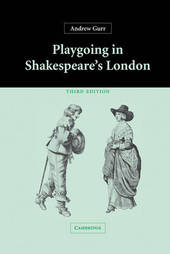
|
Playgoing in Shakespeare's London
Hardback
Main Details
| Title |
Playgoing in Shakespeare's London
|
| Authors and Contributors |
By (author) Andrew Gurr
|
| Physical Properties |
| Format:Hardback | | Pages:360 | | Dimensions(mm): Height 229,Width 152 |
|
| Category/Genre | Drama |
|---|
| ISBN/Barcode |
9780521835602
|
| Classifications | Dewey:792.09421 |
|---|
| Audience | | Tertiary Education (US: College) | | Professional & Vocational | |
|---|
| Edition |
3rd Revised edition
|
| Illustrations |
22 Halftones, unspecified
|
|
Publishing Details |
| Publisher |
Cambridge University Press
|
| Imprint |
Cambridge University Press
|
| Publication Date |
10 June 2004 |
| Publication Country |
United Kingdom
|
Description
This is a newly revised edition of Andrew Gurr's classic account of the people for whom Shakespeare wrote his plays. Gurr assembles evidence from the writings of the time to describe the physical structure of the playhouses, the services provided in the auditorium, the cost of a ticket and a cushion, the size of the crowds, the smells, the pickpockets, and the collective feelings generated by the plays. As well as revising and adding new material which has emerged since the second edition, Gurr develops new sections. He considers the difference between Shakespearean and modern thinking about early staging, the complex historical process which established the permanent playhouses, and the development of a distinctly different acting style in the open-air playhouses from that of the indoor halls. Fifty new entries have been added to the list of playgoers and there are a dozen fresh quotations about the experience of playgoing.
Author Biography
Andrew Gurr is Emeritus Professor, University of Reading. His many books include The Shakespearean Stage 1574-1642 (third edition 1993), Writers in Exile, Playgoing in Shakespeare's London (second edition 1996), The Shakespearian Playing Companies (1996), and (with Mariko Ichikawa) Staging in Shakespeare's Theatres (2000).
Reviews"...a staple in Shakespeare studies. Essential." P.D. Nelsen, Marlboro College, CHOICE "This amusing glimpse into the habits of the London audiences, and the use to which Gurr puts it, are characteristic of his informative study." The Times Literary Supplement
|